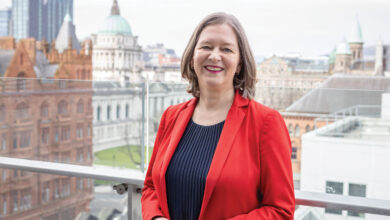Climate pressures and positives
 Professor John Sweeney sees some changing attitudes as the Mexico conference approaches.
Professor John Sweeney sees some changing attitudes as the Mexico conference approaches.
As for a warmer Ireland, pressure on water supplies will increase and planning ahead must start now.
“Like many people, I came back from Copenhagen very disillusioned and very much disappointed with the way that the political priorities had shifted,” John Sweeney comments. The NUI Maynooth climatologist, though, sees some positives from that conference which could carry over to the Mexico summit.
The Copenhagen Accord was not a comprehensive agreement, as had been hoped, but does require individual countries to produce estimates for the reductions they are prepared to consider.
Sweeney also suggests that the EU “certainly has to try and play a more central role as an honest broker between the big bloc countries of the developed world and the big bloc countries of the developing world.”
Europe was “excluded” at last December’s talks but he is encouraged by the change in attitude in some previously sceptical countries.
“We are seeing some of the big names shifting away from passive to active involvement,” he notes.
The USA, for example, has committed itself to a 70 per cent reduction on 2008 emissions. Russia is also taking climate change more seriously after the unprecedented summer fires. China and India are, though, “holding out to the bitter end.”
Based in the Republic, he finds that the Irish Government’s commitment to tackling the problem has improved over the last four to five years, even before the Green Party entered government.
“We had two rather anodyne national climate change strategies which really didn’t change very much on the ground,” he says, on the period before the 2007-2020 strategy was launched. “Unless we got serious about the issue, we would be paying very substantial fines for exceeding our Kyoto commitments.”
It was quite clear, he adds, that the trajectory Ireland was on in terms of greenhouse gas emissions was not sustainable.
The new approach is seen in the rebalancing of road tax towards cars with higher carbon dioxide emissions and the introduction of the carbon tax. That commitment is, though, much greater at the highest levels of government compared to local government, which has less personnel or expertise on climate change.
Many of the decisions about adapting to climate change must be made now, he emphasises. This includes increasing the water supply for urban areas, which has a 10-15 year lead time in planning and construction.
“We cannot wait for the experiment to happen to take action in a lot of areas,” he comments.
Adaptation also makes economic sense, and can give Ireland an advantage e.g. if farmers on the island can produce and grow crops more economically than their competitors.
“Ultimately if we haven’t got the urge or the will to adapt we will certainly not be competitive in future in many sectors,” he adds.
Research by Sweeney and his counterparts indicates that warmer temperatures will bring about major changes to the island’s habitats and species. The traditional landscape which attracts tourists is therefore set to change.
However, he thinks that the adaptation to tourism will be “quite positive”, resulting in an extended “shoulder season” for the sector. June and September will become more important months in the tourism calendar and government will also need to plan ahead to cope with the pressure on water supplies and waste water treatment in tourist resorts.
One long-term consequence could be that Ireland becomes the “favoured destination” for Mediterranean residents escaping the intense heat in their home countries – a reversal of the seasonal exodus of northern Europeans flying south for warmth.





